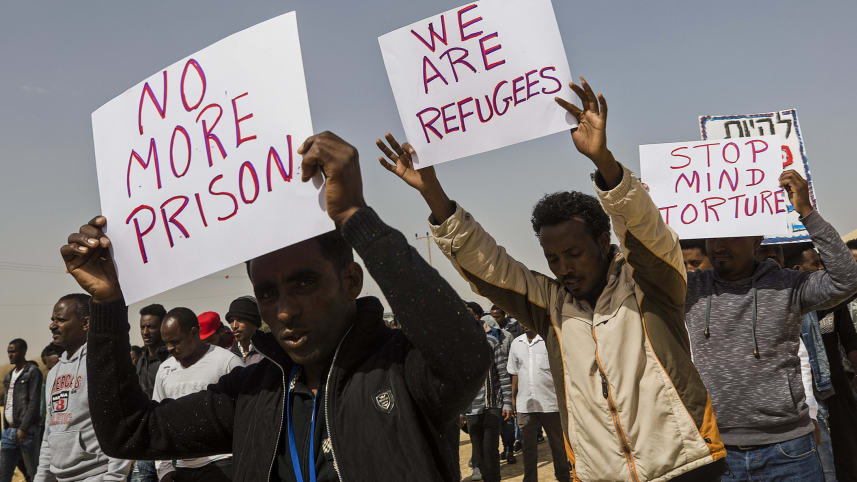- About Us
- Policy Center
- Learn
- Press Room
- Blog
- Get Involved
- Donate
- Donate to J Street Online
- Make a Gift in Someone’s Honor or Memory
- Make a Monthly Gift
- Tax-Deductible Donations
- Giving by mail
The Israeli government’s policy of deporting tens of thousands of undocumented African migrants has caused tremendous heartache among Jews everywhere. It seems so obviously to violate key precepts of our heritage and goes against the bitter lessons we have learned from our own history.
The deportation policy is also damaging Israel’s reputation in the United States and around the world. If it continues, it will become a dark stain on the conscience of the nation.
The latest sign of this is the publication this week of a letter sent by the US Congressional Black Caucus to Prime Minister Netanyahu. Signed by prominent lawmakers including Senator Cory Booker (D-NJ), the letter urges Israel not to deport thousands of asylum seekers and instead “to pursue alternative means to respond to the African migrants who seek refuge within its borders.”
“We are deeply concerned for the welfare of African migrants who have been resettled and the risk to those who face deportation,” the lawmakers write in their letter. “Press reports indicate that migrants who have been resettled in third-party countries have faced torture and extortion. Furthermore, nonprofit groups have reported that migrants are not granted a legal path to asylum or temporary protected status in their resettlement countries, nor adequate opportunities for employment.”
The letter also notes reports that “migrants are vulnerable to human traffickers and can become trapped in a cycle of abuse, sent to prison camps where they are tortured, or die attempting to flee other nations.”

Credit: Tsafrir Abayov/AP via Haaretz
Netanyahu’s deeply unjust policy has stirred significant opposition in Israel. Some El Al pilots said they would not fly planes carrying deportees to Africa — and last weekend around 20,000 Israelis gathered in Tel Aviv to protest against the deportations and imprisonment.
For a nation founded to be a refuge for Jews worldwide who have suffered from persecution to be engaging in the mass deportation of refugees is inexplicable and unacceptable. These migrants, most of whom came from Sudan and Eritrea, do not pose a security threat. Neither can it be argued that allowing them to stay would make any significant impact on Israel’s demography or Jewish majority.
We are talking about around 38,000 human beings; as non-Jews, none of them now have a clear mechanism to gain citizenship. Surely a humanitarian exception can and should be carved out for these unfortunate and imperiled people who have nowhere else to go.
The Netanyahu government apparently is not willing to consider any such alternatives. Instead, it drew up a plan with the governments of Rwanda and Uganda under which Israel will pay them $5,000 for each refugee they take in. What happens to the deported asylum-seekers after that — and they are at risk of facing violence or ending up in refugee camps — is apparently not Israel’s problem or responsibility.
Early this year, the Netanyahu government announced that the asylum seekers had three months to leave the country or face detention. In early February, the government began issuing deportation notices. Last week, seven asylum seekers were transferred from the Holot facility, a desert detention center near the Egyptian border, to Saharonim Prison. Hundreds of asylum seekers detained in Holot began a hunger strike in response. The situation is reaching a crisis point.
Israel has a chance to act with justice and compassion, to dispel charges of racism and to alleviate the concerns raised by the Congressional Black Caucus and other friends around the world. But to do so, it must reverse this awful policy.